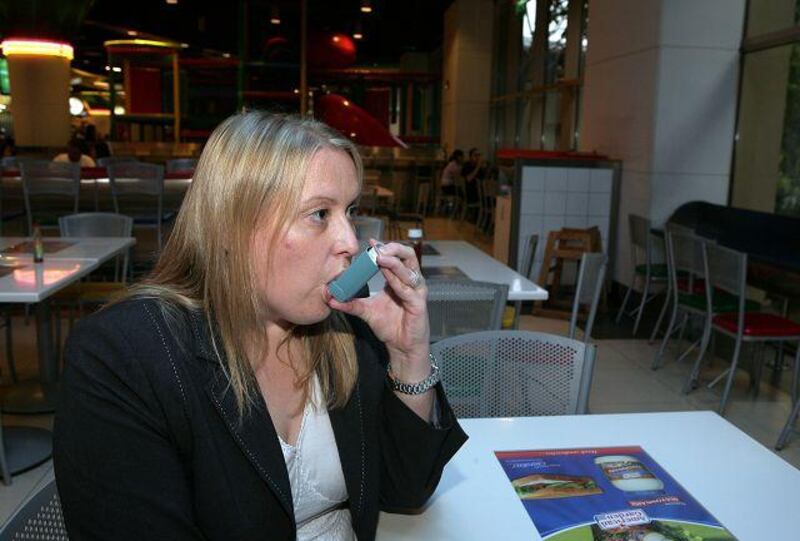ABU DHABI // Asthmatics are endangering their lives and draining the health system of millions of dirhams annually by over-relying on "rescue" medications instead of preventive treatments, according to the region's largest study of the disease.
The Asthma Insights and Reality in the Gulf and the Near East study found that only 5.5 per cent of the 200 asthmatics surveyed across the Emirates used preventive treatments such as inhaled steroids. That figure is "shockingly low", according to Dr Zouhair Harb, a lung specialist working in Abu Dhabi. The report, released last month, interviewed 1,000 asthmatics in the UAE, Jordan, Kuwait, Lebanon and Oman between January 2007 and March 2008.
The study showed that more than 31 per cent of asthma sufferers surveyed had been hospitalised or sent to emergency rooms during the period, although most of the admissions had been preventable. Another 48 per cent fell back on emergency bronchodilators to bail themselves out of asthma attacks. It concluded: "[Regional] asthma morbidity is high, with an unacceptably high reliance on the use of emergency or rescue care."
Ignorance about the respiratory disorder, which constricts the airways, "places a great burden on the healthcare system and society as a whole, with substantial loss of time from work and school", it added. Patient denial is also to blame, the researchers said. Dr Bassam Mahboub, who led the UAE surveys at the University of Sharjah, said most asthma-related fatalities occurred because patients "don't perceive themselves as having a disease, so they stop medication".
He is now studying the economic impact that poorly managed asthma has on the health sector, which he estimates to be in the "hundreds of millions" of dirhams. "We actually need a majority of our asthmatic patients to be on the controlled medications," said Dr Mahboub, a member of the Emirates Respiratory Society. "So 5.5 per cent is way too low." The findings are particularly grim given that the UAE has one of the highest rates of asthma in the world; doctors estimate that 15 per cent of the population suffers from the condition.
The European average is about seven per cent, based on 2004 figures from the Global Initiative for Asthma. And in 2005, the prevalence of asthma in the US was just under eight per cent, according to the American Academy of Allergy, Asthma and Immunology. "But it's especially hard [in the UAE], where you have a lot of dust and dependence on airconditioning," said Dr Harb, of the Advanced Cure Diagnostic Centre in Al Bateen. "That's a lot of wear and tear on the airways."
The Lebanese-American lung specialist was dismayed by the study's finding that fewer asthmatics in the UAE than in any of the countries surveyed were proactively treating their illness. "In a perfect world, I would be expecting 100 per cent of asthmatics [to use preventive inhalers]," he said. "Really 5.5 per cent in the UAE is quite low. Shockingly low." Dr Harb estimated that 30 to 50 per cent of asthmatics in the most developed countries use the recommended steroid therapies.
According to the report, nearly 30 per cent of Lebanese patients use preventive inhalers. Roughly 19 per cent of Kuwaitis are also on controlled treatments. Quick-relief medications such as bronchodilator puffers reopen clogged airways during bouts of breathlessness. But daily steroid therapy prevents the attacks from happening in the first place. "[The patients] have a choice between two medicines," Dr Harb said. "A rescue medication will work within five minutes and the maintenance one will work maybe over a week. They're going for the quick gratification, the immediate remedy, which isn't the right remedy."
Overusing the emergency devices can stress the lungs and cause long-term problems. Fixed doses of preventive steroids control inflammation in the lungs, said Dr Asif Sattar, a pulmonologist at City Hospital in Dubai. "It seems people in Dubai tend to use emergency departments more and tend not to follow up with their physicians regularly," he said. "Well-controlled asthmatics shouldn't need to use their reliever at all."
Dr Sattar said patients might dismiss preventive treatments because they might not realise they have a chronic disease. There may also be negative connotations associated with the idea of taking steroids, although the inhaled steroids are safe, he said. Dr Ashraf al Zaabi, the head of the respiratory division at Zayed Military Hospital, hoped the study would better inform physicians and patients about the importance of preventive therapies.
"This low compliance with the controlled medication is not surprising," he said. "But there are explanations." For one, he said "especially younger patients tend to get fed up with taking medicines" over a long period of time. Dr al Zaabi also noted that half of the UAE respondents in the study were Emiratis, while the remainder were mostly other Arabs and South Asians. "A lot of those guys can't afford the Dh200 or Dh300 medications, so that might explain the low percentage, with those non-nationals perhaps not having health insurance."
Unlike in the UK, many asthma medications in the UAE can be purchased over the counter. In some cases, patients who self-medicate might buy only rescue puffers. "We know that asthmatics tend to have poor perception of the control over their condition, so patients sometimes delay seeking medical advice until they are really bad," he said. @Email:mkwong@thenational.ae





